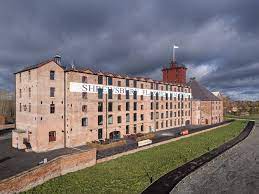Bath architecture practice Feilden Clegg Bradley Studios has completed the multi-million pound renovation of a building regarded as the forerunner of the modern skyscraper.
The firm’s £28m repair and upgrade project at Flaxmill Maltings in Shrewsbury, pictured, has transformed the building into a low-carbon, mixed-use development, and a catalyst for economic regeneration of the area.

The former flaxmill, constructed in 1787, was the first building in the world to be constructed with an iron frame.
This gave better fire protection than previous wood-framed buildings and paved the way for modern-day steel-framed tall buildings.
As a result, Flaxmill Maltings has been described as one of the most important of the industrial revolution, paving the way for iconic buildings constructed hundreds of years later such as London’s Shard, New York’s Empire State Building and Dubai’s Burj Khalifa.
Feilden Clegg Bradley Studios’ work on the Grade I listed building includes turning its ground floor into an exhibition space telling the story of the building and its evolving industry, along with a public café.
Above are four floors of newly refurbished workspaces, pictured, with circulation and meeting space in the impressive former kiln building.

The building operated for nearly a century as a state-of-the-art steam-powered flax mill. It was later converted into maltings and during the Second World War the site was used as temporary military barracks.
Following the closure of the maltings in 1987, the future of the site and its important buildings became increasingly uncertain until it was bought by Historic England in 2005.
As it had been derelict for many years, Feilden Clegg Bradley Studios had to overcome a number of immense technical challenges and to identify a suitable use for the building.
A spokesman for the practice said: “Putting the building ‘back-to-work' required comprehensive repair of the existing fabric and the insertion of new core facilities.
“Bold interventions and a light-touch conservation approach was employed to seek to preserve and enhance the special character.
The project team repaired, reused and retrofitted driven by the values of innovation, revolution and adaptation.
“The fixed budget and high-quality standard called for the team to work together in new resourceful ways and be scornful of any form of waste. We believe the project is an exemplar of striving to towards a circular economy.”
The firm also set up a heritage skills programme during the construction work, using the site itself as a tool for learning.
It also engaged with the local community and wider interest groups to help energise interest in the project.
The spokesman added: “Through developing a narrative around the site, hosting events, art exhibitions, and heritage open days there has been a positive increase in community involvement and a palpable sense of increased pride in the area.”
Feilden Clegg Bradley Studios, which also has offices in London, Manchester and Belfast, was formed more than 40 years ago and today is viewed as one of the UK’s most progressive and ethical architectural practices.
Its most recent work in Bath includes the Roman Baths Clore Learning Centre and World Heritage Centre.



















